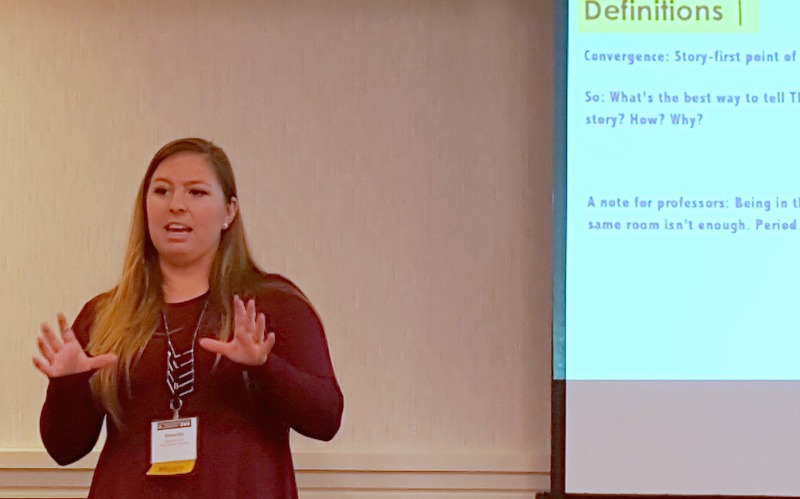Page 67 • (3,805 results in 0.021 seconds)
-

amazing because of the conference, but getting to spend time with other students in New York City is a memory I’ll fondly remember. Something as simple as journalism and our desire to learn brought hundreds of students together in one of the most amazing cities in the world. I traveled with a group of five PLU students who all brought back memories and gained a lot from the experience. PLU’s Center for Media Studies funded my trip, while PLU Student Media funded other students. None of us could be
-
% per year. The Class of 1971 Endowed Gap Scholarship will be given to Junior or Senior students who need help decreasing this “gap.” This is a critical retention tool, allowing students to stay and graduate from PLU.Give to the Class of 1971 Endowed Gap ScholarshipScholarships Established by Members of the Class of 1971Mrs. Shirley E. Aikin – Travis and Shirley Aikin Memorial Nursing Scholarship – Shirley Aikin (Coleman ’71, ’78, ’96) established this scholarship in memory of her late husband
-
Memory Improvement (pdf) view download
-
Student-Faculty Publication: Bringing a Berry Back from the Land of the DeadAn Environmental Studies capstone has led to a co-authored publication for Kimberly Wogahn (’14) and Religion Professor Suzanne Crawford O’Brien. Wogahn’s senior capstone in Environmental Studies provided a critical assessment of the (predominantly Euroamerican) organic and slow-food movement, placing it in contrast with efforts to improve food accessibility for marginalized and at-risk communities. One aspect of her
-
Meet Your Sojourner Advocates Sonja Schaefer Studied Away in Beijing, China Fall 2014; Argentina/Antarctica J-Term 2014 Environmental Literature Class of 2016 Majors: Economics and Chinese Studies International Honors Entering PLU as undeclared but sure I wanted to study away, left me unsure on where and about what I wanted to study… But I did get started early my freshman year talking to Wang Center staff about my options. As freshman year progressed, I slowly realized that Economics and
-

years, I’ve developed a course for our International Honors program, and I’ve learned all sorts of amazing new music doing that. I’ve done the same for our Nordic Studies program and learned all sorts of great Scandinavian music (from Grieg to Heavy Metal) that I would not have known about without teaching that course. Now I’m working on a similar course in film music for our new Film Studies program. Would you share your favorite memory from a performance? When I was eight years old, I performed
-
¡Bienvenidos! | Welcome! Study Tour to Pueblos Mancomunados del Norte. September 15-17 2017. Development | Culture | Social Change Designed for advanced Spanish language students with an interest in Latin American Studies, this unique semester program explores the intersection of development, culture, and social change through the lens of the dynamic and evolving context of contemporary Mexico. Located in the southwestern Mexican state of Oaxaca – declared “Humanity’s Cultural Patrimony” by the
-
International AffairsInteraction on an international scale raises complex issues that are best analyzed from multiple disciplinary perspectives. Diplomacy and political relations require understanding not just of political relationships, but also of economic interactions. Conflict resolution at both domestic (such as in Rwanda) and international (such as between Israel and Palestine) levels requires diplomacy, but also deep cultural understandings. This concentration is designed to provide
-

Paul O. Ingram Lecture announced Posted by: hassonja / January 19, 2018 January 19, 2018 The Paul O. Ingram Lecture is scheduled for February 20, 2018 from 7:00 – 9:00 pm in the Scandinavian Cultural Center at Pacific Lutheran University. Guest lecturer Dr. Michelle M. Jacob will present Indigenous Environmentalism as Spiritual Responsibility. Dr. Jacob is a Professor of Indigenous Studies and Director of the Sapsik’ʷałá (Teacher) Education Program at University of Oregon. She is an enrolled
-
era (c. 3,000 BCE to c. 1500 CE), paying close attention to themes of cross-cultural encounter, the rise and fall of empires, and explorations over land and sea. We will explore global patterns of trade, technology, and expansion; the spread of ideas, religious traditions, and philosophies; the relationship between warfare, colonization, and the rise of the nation state; and how different cultural, social, and religious encounters have shaped the emergence of the modern world. (4) HIST 103
Do you have any feedback for us? If so, feel free to use our Feedback Form.


